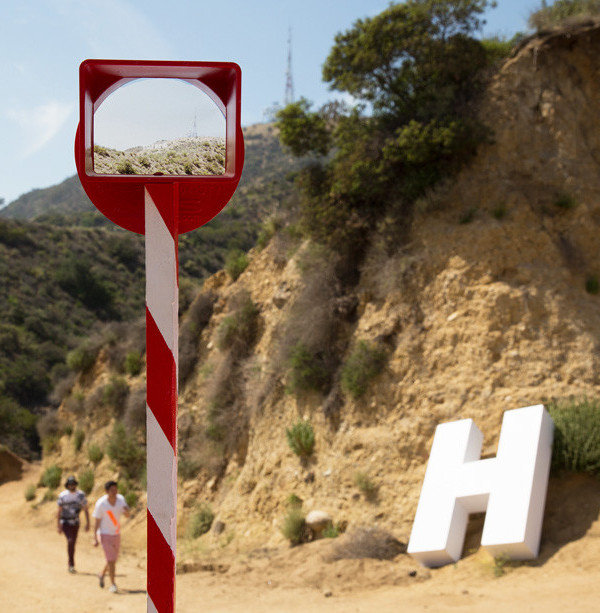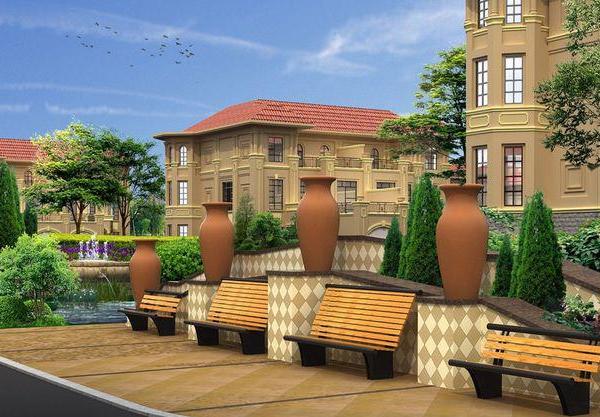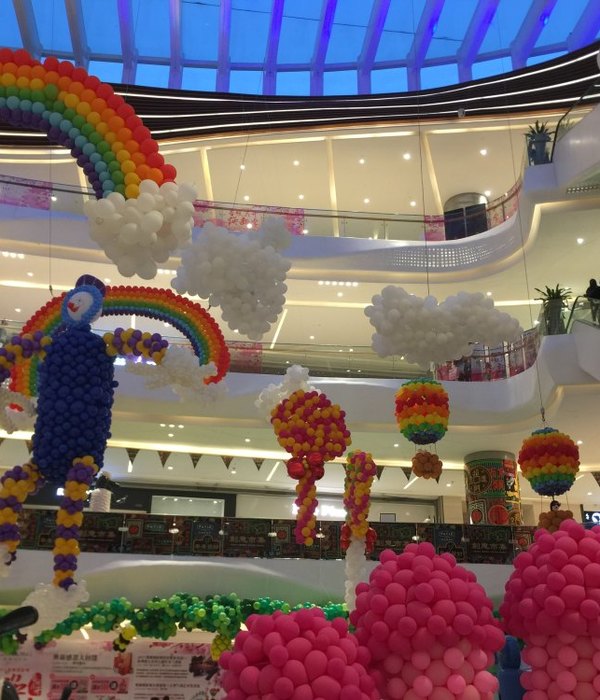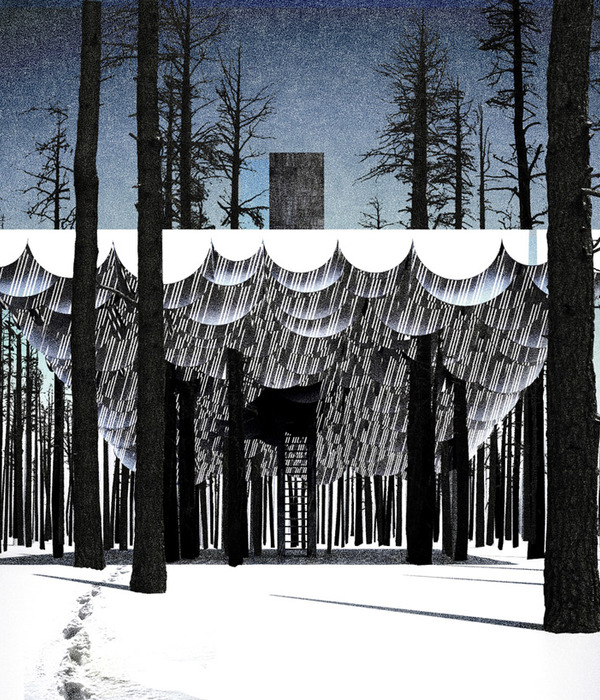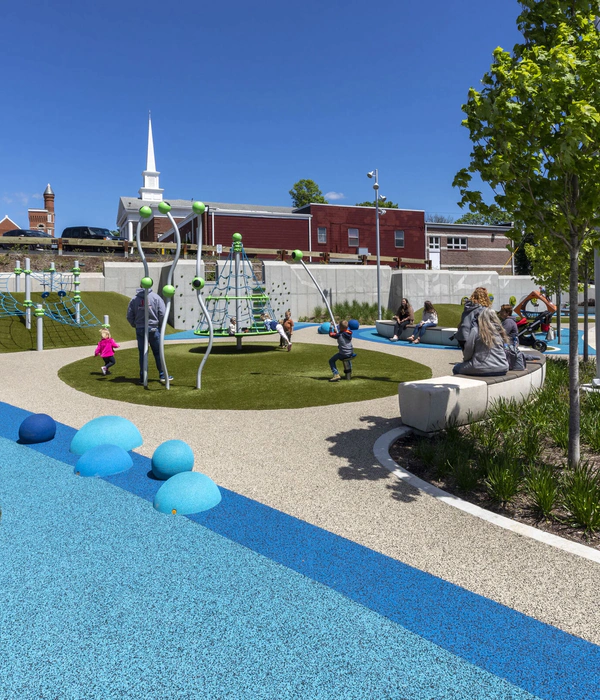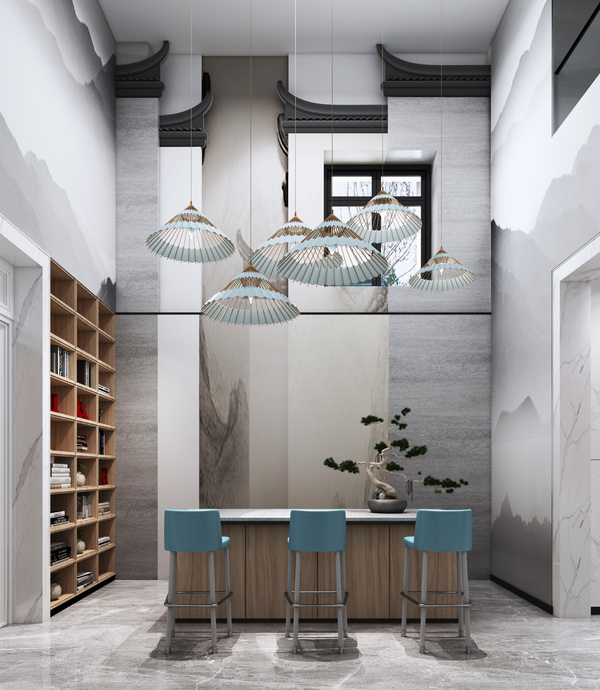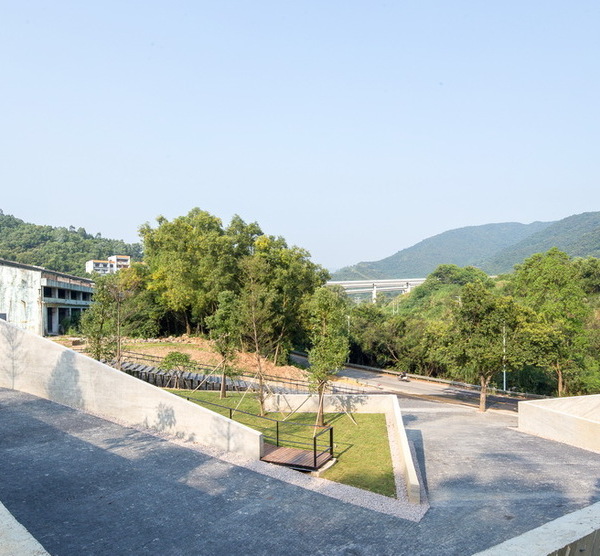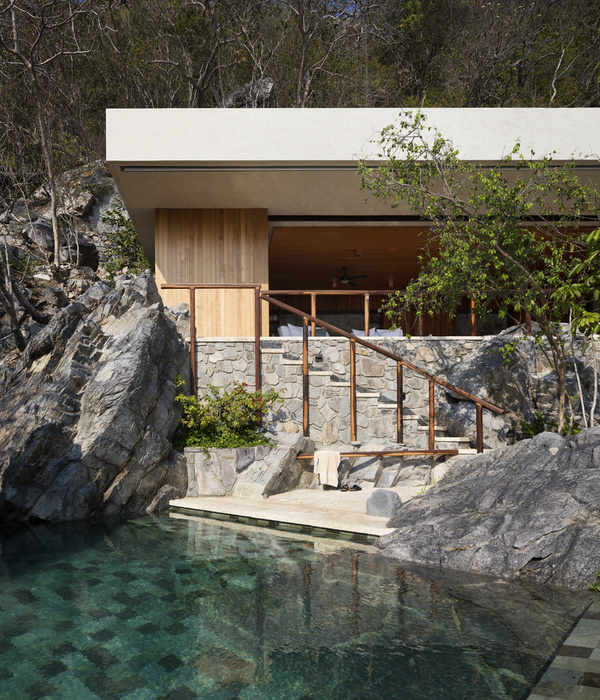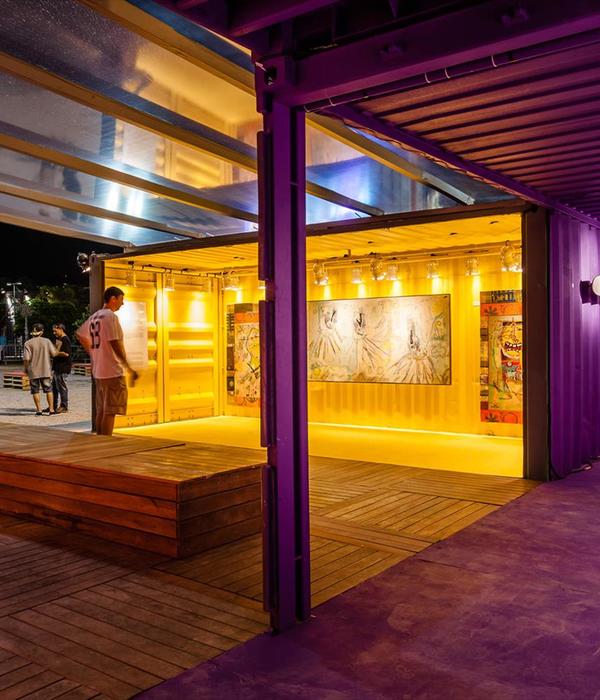本项目位于美国加利福尼亚州硅谷的中心地区Sunnyvale,由Spiegel Aihara Workshop (SAW) 设计,旨在为一个有着75套混合户型的住宅开发项目提供景观设计。梯田状的层叠花园为整个开发项目构建了联系,将公共街景与私人内部庭院连通。花园一直延伸到屋顶平台,人们可以在这里看到国王山和更远处的山麓。
Sunnyvale, CA – Spiegel Aihara Workshop (SAW) has designed the landscape for a new 75-unit, mixed-income multifamily housing development in Sunnyvale, CA, in the heart of Silicon Valley. Terraced gardens tie the development together, connecting the public streetscape to the private interior courtyards, all the way to the roof deck with views to Kings Mountain and the foothills beyond.
▼庭院空间概览,overview of the garden
设计师在项目的各个层面都创造了健全的社区空间,雨水处理花盆与景观的层叠设计融为一体。该项目被人们亲切地称为“Denny’s上空的花园”——Denny’s是长期存在于该场地的一家主打怀旧氛围的美式连锁餐厅,由于深受当地社区的认可,因此在项目完工后重新成为了该物业的主要租户。
Robust community spaces are created at all levels, with stormwater treatment planters seamlessly integrated into the cascading design. The project is playfully referred to as “Gardens Over Denny’s”, in reference to the beloved Denny’s restaurant (an American chain diner that evokes a certain nostalgia) that had long existed on the site, and through community endorsement, returned to become the development’s anchor tenant.
▼景观空间分析,analysis diagram of the landscape spaces
SAW的景观设计方案以丰富的层级和视角为特征。在庭院层级,设计师创造了篝火聚会区、烤架和餐桌。裙楼庭院内不同土壤深度的种植池由精致的金属材料包边,为种植不同高度和密度的植物提供了空间——保障了不同的团体聚会和周边的其他单位的隐私性。
Layered, multivalent views characterize SAW’s approach to the landscape. At the Courtyard level, which includes fire-pit lounges and a community grill and dining table, carefully detailed metal edges delineate alternating bands of varying soil depths on the podium courtyard, which allow for both intensive and extensive plantings of varying heights and textures – critical for providing privacy for different group gatherings and for the individual units along the perimeter.
▼俯瞰庭院入口,look down to the garden entrance
▼俯瞰篝火聚会区,look down to the fire-pit lounge
▼篝火聚会区近景,close shot of the fire-pit lounge
▼高度层次丰富的种植池,plantation areas with multiple height layers
具有交错垂直支撑的遮阳构筑物也有助于增强视觉上的层次感,如徜徉于画卷一般。庭院内活动的人们,甚至是周边的行人,都会在前景、中景和背景中观察到丰富的、多方向元素的组合。
Shade structures with staggered vertical supports also contribute to the layered visual effect, not unlike a painting, in which one might observe a rich composition of disparate, multi-directional elements in the foreground, middle ground, and background – including moving passers-by.
▼种植池近景,close shot of the plantation pot
在街道层级,设计师利用了多种景观空间原型,将这个新开发的项目融入现有的城市肌理中。在South Mathilda大道沿线的项目东侧,设计师设置了一个狭长的雨水收集种植池,配置了本地原生植物和优雅的座椅墙,为等待公共交通的居民提供座椅。而在建筑物的北边,树蕨从混合遮荫植物群中生长,为公寓大堂及办公室和市中心繁杂的交通之间提供了屏障。
At the street level, the design includes a variety of landscape types to stitch the new development into its urban fabric. On the eastern side of the property along South Mathilda Avenue, a long stormwater planter with mixed native plantings and a gracious seat wall provides seating for residents awaiting public transportation, while on the northern edge of the building, tree ferns rise above mixed shade plantings to screen the apartment lobby and offices from the downtown traffic.
▼丰富的植物层次为住宅大堂及办公室提供了屏障,
the multi layer vegetations work as a screen for the lobby and office
在建筑东北角,一个带有雕塑长椅、装饰性铺路和棕榈树的广场将本项目与市中心的商业走廊连接起来。在西侧,一座5层楼的建筑被缩小为一个2层的联排别墅,层层叠叠的草丛、五颜六色的灌木和矮小的洋杨梅树(一种会脱落红色树皮的地中海地区的浆果鹃属植物),这些植物作为入户景观欢迎着周边的居民。
At this northeast corner, a plaza with sculptural benches, decorative paving and palm trees connects the property to a commercial downtown corridor. On the western edge, the 5-story building scales down to 2-story townhouses with playful layerings of grasses, colorful shrubs and dwarf strawberry trees with its red, exfoliating bark providing a welcoming threshold to meet the adjacent residential neighborhood.
▼透过植物种植区看向小广场,a view from the plantation area to the square
在5楼,屋顶平台提供了一个能享受明媚阳光的休憩之所,可以欣赏到国王山和更远的景色,树木的轮廓线相互交融,住宅项目和外部自然环境通过连续的树冠融合在一起。从住宅区通向庭院层的大楼梯两侧是宽阔的花园露台,上方交错着优雅的拱形紫荆树,在视觉上柔化了雨水基础设施的交界处,这些雨水基础设施将处理从多个建筑屋顶和庭院人行道流出的雨水。
At the 5th floor, a roof deck provides a sunny retreat with views to Kings Mountain and beyond, where tree lines blur together across boundaries, blending property lines through a continuous canopy. The large stairway leading up to the courtyard level from the residential zone is flanked by wide garden terraces staggered with gracefully arching redbud trees, softening the confluence of stormwater infrastructure necessary to treat the water flowing from the multiple building roofs and courtyard pavements.
▼在屋顶平台可以远眺周边山景,the roof deck provides a view to mountain
SAW的合作伙伴Megumi Aihara解释说:“这个开发项目位于硅谷的中心地带,这里曾经是一个沉睡的低矮街区,毗邻广阔的商业区。我们试图利用景观在社区内部和社区之间建立联系,每个街景都以不同的形式延伸到社区内。即使是一个私人的高架庭院花园空间,仍然通过一排排树木与街道相连,让新居民与现有住宅接触。我们认为这样的景观空间有助于为这个住宅开发项目赋予新的身份。”
SAW partner Megumi Aihara explains, “This development is in the heart of Silicon Valley, in what was a formerly sleepy, low neighborhood, adjacent to vast commercial lots. We were trying to use the landscape to create connections within and between communities, with each streetscape reaching out to the neighborhood in a different way. Even the elevated courtyard garden, a private space, remains connected to the street level through a cascade of trees that engages new residents with the existing homes. We felt this landscape helped give the development an identity.”
▼木质种植池及休闲桌椅近景,close shot of the wooden plantation plot and the recreational facilities
▼轴测图,axonometric drawing
Project Team: Spiegel Aihara Workshop (SAW)
Client: Bay West Development / Lane Partners
Architect: Studio T-SQ, Inc
Landscape Architect: SAW (Sharon Ling, Avery Sell, Megumi Aihara) Civil Engineer: BKF Engineers
Structural Engineer: Hohbach-Lewin, Inc
General Contractor: Johnston Moyer, Inc
更多关于他们:
SAW
{{item.text_origin}}

